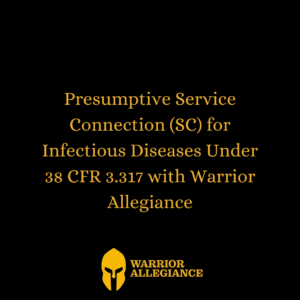
As a veteran-focused organization dedicated to assisting veterans with their disability compensation claims, Warrior Allegiance aims to provide comprehensive information on presumptive service connection (SC) for infectious diseases under 38 CFR 3.317. This regulation outlines the criteria for establishing SC for specified infectious diseases based on qualifying service and manifestation periods.
Qualifying Service for Presumptive SC of Infectious Diseases
Veterans seeking presumptive SC for infectious diseases must have served in specific theaters of operations during defined periods. According to 38 CFR 3.317(c)(3)(ii), qualifying service includes deployment in the Southwest Asia theater of operations during the Gulf War or service in Afghanistan on or after September 19, 2001. It’s important to note that while some service locations overlap, the qualifying service for presumptive SC of infectious diseases is distinct from Persian Gulf Veteran service outlined in 38 U.S.C. 1117 for presumptive SC of undiagnosed illnesses and medically unexplained chronic multi-symptom illness (MUCMIs).
Presumptive SC for Infectious Diseases
Effective September 29, 2010, presumptive SC is established for specified infectious diseases if the veteran had qualifying service and the disease becomes manifest to a compensable degree within the specified time limit. This ensures that veterans receive the necessary support for conditions arising from their service.
Manifestation Period for Infectious Diseases
Each recognized presumptive infectious disease has a specific manifestation period outlined in 38 CFR 3.317(c)(3)(i). For example, diseases like Brucellosis, Campylobacter jejuni, and Coxiella burnetii (Q fever) have a one-year manifestation period, while others like Mycobacterium tuberculosis have no time limit for manifestation. Understanding these time frames is crucial for filing claims and receiving timely assistance.
Considering Long-Term Health Effects
Warrior Allegiance recognizes the importance of addressing long-term health effects potentially associated with infectious diseases.
Developing Claims for Infectious Disease
When developing claims for infectious diseases, Warrior Allegiance emphasizes the importance of following specific procedures outlined in M21-1, Part VIII, Subpart ii, 1.D.2. This includes assessing qualifying services, gathering evidence of the infectious disease within the specified time limit, and considering potential long-term health effects. Requesting examinations, when necessary, ensures that claims are accurately evaluated, leading to fair decisions for veterans.
Rating Claims for Infectious Disease
Proper coding is essential for tracking infectious disease claims in the Veterans Benefits Management System – Ratings (VBMS-R). By assigning the Gulf War Presumptive special issue and specific issue basis for the infectious disease, regional offices can effectively manage and process claims. Warrior Allegiance emphasizes the need for accuracy and attention to detail in coding to facilitate timely assistance for veterans.
Conclusion
Presumptive service connection for infectious diseases under 38 CFR 3.317 plays a vital role in ensuring veterans receive the support they deserve for service-related conditions. Through evidence-based fact-finding and proven methods, Warrior Allegiance is committed to assisting veterans with their disability compensation claims, providing guidance and advocacy every step of the way.
https://warriorallegiance.com/fbgetstarted/

